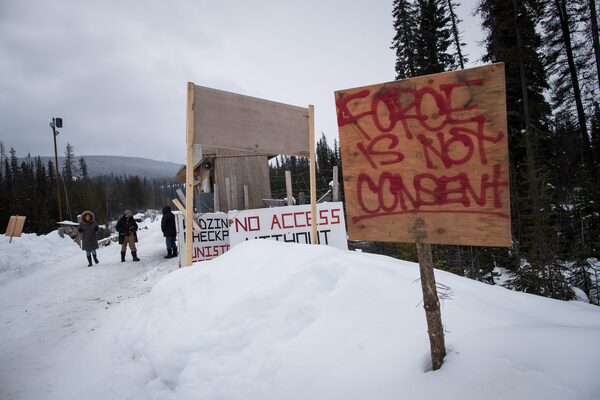
A checkpoint is seen at a bridge leading to the Unist'ot'en camp on a remote logging road near Houston, B.C., on Jan. 17, 2019. The pipeline project is designed to transport natural gas from northeastern British Columbia along a 670-kilometre route to LNG Canada’s $18-billion export terminal.DARRYL DYCK/The Canadian Press
TC Energy Corp. will be forced to halt construction on a section of its $6.6-billion Coastal GasLink pipeline this week amid an escalating dispute with Indigenous hereditary chiefs.
Construction workers, who have been away on holidays, are scheduled to return to the area on Monday, but won’t be able to gain access because of a blockage along a remote logging road.
On Dec. 31, a B.C. Supreme Court judge extended an injunction against Coastal GasLink protesters, saying the project has been harmed by the Wet’suwet’en Nation’s blockades. But hereditary house chiefs disagree with the court ruling and in an attempt to turn the tables, they issued their own “eviction notice” on Saturday on the Wet’suwet’en’s unceded territory near Houston, B.C.
“Over the past year, Coastal GasLink has operated on our territories despite our opposition to the project,” according to a letter endorsed by eight men who serve as hereditary house chiefs. “We must reassert our jurisdiction over these lands, our right to determine access and prevent trespass under Wet’suwet’en law."
They addressed their letter to Coastal GasLink president David Pfeiffer and the manager of Indigenous relations, Jill Salus.
In a statement, the company expressed disappointment by the turn of events. “Coastal GasLink personnel discovered that trees had been felled on the Morice River Forest Service Road," it said on Sunday. "While it is unclear who felled these trees, this action is a clear violation of the interlocutory injunction as it prevents our crews from accessing work areas.”
Coastal GasLink also said a Wet’suwet’en group is cancelling an agreement that had allowed pipeline workers to cross the Morice River Bridge to get to construction sites last year.
“We’re continuing to remobilize our contractors following the holiday break and a date for construction resumption has not been determined,” Coastal GasLink spokeswoman Suzanne Wilton said in an e-mail.
The project is designed to transport natural gas from northeastern British Columbia along a 670-kilometre route to LNG Canada’s $18-billion export terminal, currently under construction in the community of Kitimat on the West Coast. Royal Dutch Shell PLC leads the LNG Canada consortium, which plans to begin exports of liquefied natural gas to Asia in 2025.
On Jan. 7, 2019, RCMP arrested 14 protesters at a police checkpoint along a remote B.C. logging road that leads to the Unist’ot’en protest camp. Unist’ot’en is affiliated with Dark House, one of 13 Wet’suwet’en hereditary house groups, which in turn fall under five clans.
“We remain peaceful and strong in our own law of protection of our rights and title, and protection of the environment,” John Ridsdale, chief of Rafters on Beaver House, said in an e-mail on Sunday to The Globe and Mail.
Eight of nine house chiefs are opposed to the Coastal GasLink project, with one man taking a neutral position. Four other house-chief positions are vacant.
Coastal GasLink launched its court case against protesters in November, 2018, arguing that defendants Freda Huson and Warner Naziel are the architects behind the Unist’ot’en camp near the Morice River Bridge.
“The plaintiff estimated that the costs of managing further delays would be in the tens of millions of dollars,” Justice Marguerite Church wrote in her 51-page reasons for judgment on Dec. 31.
Five of the 20 elected band councils that support the project belong to the Wet’suwet’en Nation: Wet’suwet’en First Nation (formerly known as the Broman Lake Indian Band), Burns Lake, Nee Tahi Buhn, Skin Tyee and Witset.
Ms. Huson, who lost in her re-election bid last year to stay on the Witset Band Council, remains an influential member of Dark House. Mr. Naziel serves as chief of Sun House.
Justice Church said in her ruling that there are major rifts and complexities within the Wet’suwet’en Nation. "The Wet’suwet’en people have both hereditary and Indian Act band council governance systems and there is dispute over the extent of the jurisdictions of each of those governance systems,” she said.
The project has been approved by all 20 elected First Nation councils along the route, but hereditary chiefs say Indigenous authority rests with hereditary and not elected leaders over the Wet’suwet’en’s traditional territory, in which 28 per cent of the pipeline route would cross.
Wet’suwet’en hereditary chiefs had enjoyed widespread support for years from elected First Nation councillors who vehemently opposed Enbridge Inc.’s now-defunct plans for the Northern Gateway oil pipeline from northern Alberta to Kitimat. But the co-operative relationship between hereditary chiefs and elected First Nation leaders eroded in 2015 as band councils on federal reserves embraced a natural-gas pipeline route as an acceptable environmental risk.
TC Energy Corp., which owns Coastal GasLink, announced on Dec. 26 that it will be selling a 65-per-cent stake in the pipeline project to Alberta Investment Management Corp. and KKR & Co., with the transaction slated to close in the first half of 2020.
Your time is valuable. Have the Top Business Headlines newsletter conveniently delivered to your inbox in the morning or evening. Sign up today.
 Brent Jang
Brent Jang